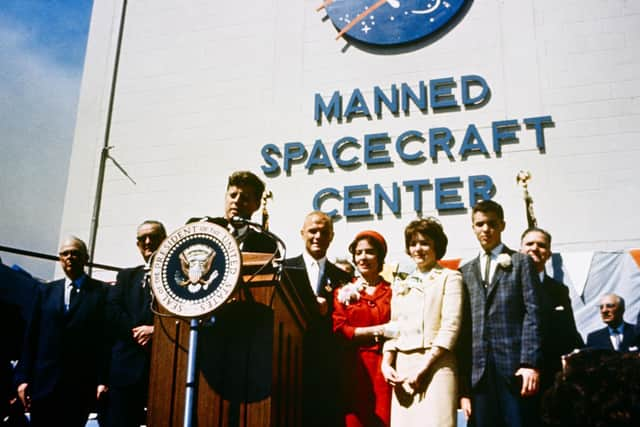The examples that Yorkshire can learn from JFK and the space race - Mark Casci
Speaking before the US congress he pledged that the US “should commit itself to achieving the goal, before this decade is out, of landing a man on the Moon and returning him safely to the Earth”.
While it is today looked back upon as the proclamation of a visionary and ambitious patriot who wanted to commit his nation to an act which would represent the pinnacle of mankind’s achievements, it was at the time supreme only in its arrogance and hubris.
Advertisement
Hide AdAdvertisement
Hide AdAt the time the US was in trouble. While still the world’s leading superpower it was, on the face of it, holding on to this mantle by its fingertips. The USSR was at this stage besting the Americans in the so-called Space Race by a comfortable margin. It had launched the first satellite into space, the first mammal and the first human being in the shape of Yuri Gagarin who had completed his historic first orbit of the planet just a few weeks earlier.


The idea of both landing a man on the moon and returning him home was at this stage pure science fiction. Alan Shepard had emulated Gagarin three weeks prior to Kennedy’s speech but had not orbited the planet, rather just escaped the earth’s atmosphere for a few moments in a flight which lasted less than 16 minutes in total.
But JFK’s vision and subsequent political pressure to prevent losing any further face to the Russians, ultimately led to Neil Armstrong setting foot on the moon just over seven years later, an achievement no other nation on earth has ever been able to replicate. When the human race sets its mind in a certain way, it is capable of such extraordinary innovations so as to resemble magic.
In 1758, businessmen in West Yorkshire obtained an Act of Parliament to construct wooden rails to aid horse-drawn carriages to transport coal from a local mine. By 1812, the Middleton
Advertisement
Hide AdAdvertisement
Hide AdRailway became the first commercial railway to successfully utilise steam locomotives and, thanks to the incredible efficiencies offered by this new form of transport, Leeds was one of Europe’s most economically successful cities.


These achievements were largely motivated by the needs of humans to be more successful and earn more money than their rivals but nonetheless drove the capability of what human beings could achieve forward by tens, sometimes hundreds of years.
However, what is likely to drive us most strongly in the coming decades will be a different kind of self-interest. The drive toward net zero will be a challenge which makes the notion of sending a man to the moon resemble a fairly straight-forward request. It will require retrofitting of homes, a revolution in transportation and significant alterations to the behaviours of individuals.
However the good news is that, unlike NASA, we are not at a standing start. Just a few years ago we were trapped in a helpless narrative that told us that there was no alternative to motorcars powered by fossil fuels.
Advertisement
Hide AdAdvertisement
Hide AdWe are now in a situation in which the electric car market is so strong that the UK Government plans to ban the sale of petrol and diesel driven cars by the end of the decade. Yorkshire has the skills and geography to play a real part in this journey, as well as the ambition in some circles. But it will need more than these elements if it is to be a pioneer on this front.
It will need the leadership and visionary zeal shown by JFK in both demanding the seemingly impossible and providing the resources to make it a reality.
As he said at Houston’s Rice University a few months after his address to Congress: “We choose to go to the Moon in this decade and do the other things, not because they are easy, but because they are hard; because that goal will serve to organise and measure the best of our energies and skills, because that challenge is one that we are willing to accept, one we are unwilling to postpone, and one we intend to win.”
While I am not suggesting that Yorkshire or even Britain is likely to produce another JFK, I can live in hope, knowing that belief in what we can do has been the guiding force throughout humanity.
Comment Guidelines
National World encourages reader discussion on our stories. User feedback, insights and back-and-forth exchanges add a rich layer of context to reporting. Please review our Community Guidelines before commenting.